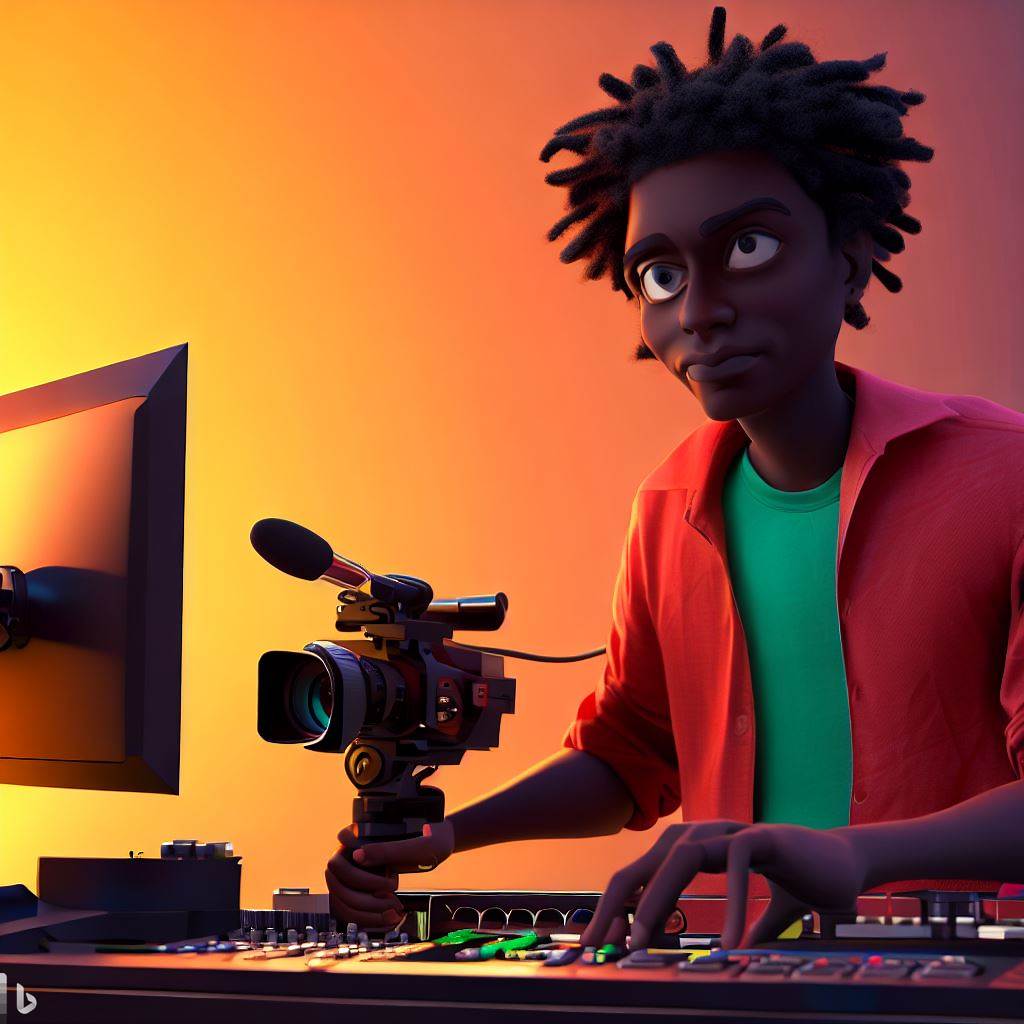Introduction
A brief overview of the animation director role
In the fast-paced and dynamic world of animation, the role of an animation director is crucial.
The animation director is responsible for overseeing the entire creative process, from storyboard development to final production.
They collaborate closely with animators, writers, and other team members, ensuring that the project meets artistic vision and objectives.
Importance of essential skills for success in the field
Being an animation director requires a diverse set of essential skills that are crucial for success in the field. These skills go beyond technical knowledge and artistic abilities.
They involve strong leadership qualities, effective communication, and the ability to manage and motivate teams.
To transform ideas into captivating visuals, an animation director needs excellent storytelling skills and a deep understanding of character development.
They must also possess a keen eye for detail and a strong sense of visual aesthetics to create visually stunning animations.
Successful animation directors are adaptable and innovative problem solvers. They can navigate through challenges and find creative solutions.
Additionally, they must stay updated with the latest industry trends and technological advancements to remain competitive in the fast-evolving animation industry.
Having strong organizational and time management skills is essential for animation directors. They must juggle multiple projects, meet tight deadlines, and ensure smooth workflows.
Moreover, being able to effectively collaborate with diverse teams and manage conflicts is vital for maintaining a positive work environment.
In the end, while technical expertise and artistic talent are important, becoming a successful animation director relies on a combination of essential skills that allow them to effectively lead, inspire, and create stunning animations.
Creativity and Imagination
Ability to generate fresh and unique ideas
- Animation directors must possess the capacity to generate innovative ideas for their projects.
- They need to think outside the box and come up with ideas that are unique and fresh.
- This skill is crucial as it helps animation directors create groundbreaking and engaging content.
- Being able to generate fresh and unique ideas sets them apart from other directors in the industry.
- Animation directors with this skill can bring novelty to their projects and captivate their audience.
Skills in storytelling and narrative development
- Animation directors need to have strong storytelling skills to convey their ideas effectively.
- They must be able to develop compelling narratives that engage and captivate the audience.
- This skill helps them create a meaningful and impactful storyline for their animations.
- It involves crafting well-structured plots, strong characters, and coherent story arcs.
- Animation directors with a strong grasp of storytelling can create animations with depth and emotional resonance.
Proficiency in visualizing and conceptualizing ideas
- Animation directors must have the ability to visualize and conceptualize their ideas.
- This skill allows them to translate their thoughts into visually appealing and coherent animations.
- They should be capable of envisioning how a scene or character should look and feel.
- Visualization and conceptualization skills enable animation directors to effectively plan and execute their projects.
- Proficiency in this area helps animation directors bring their creative visions to life.
In fact, creativity and imagination play a crucial role in the success of an animation director. The ability to generate fresh and unique ideas allows them to create groundbreaking content.
Skills in storytelling and narrative development help them create compelling and engaging animations.
Proficiency in visualizing and conceptualizing ideas enables animation directors to bring their creative visions to life. These skills combined contribute to the success of any animation director in the industry.
Transform Your Career in Nigeria
Discover unmatched expertise with our personalized Career Consulting service. Navigate Nigeria’s job market with a strategy tailored just for you.
Get StartedRead: Emerging Trends in Nigeria’s Animation Industry
Technical Expertise
A successful animation director must possess a deep understanding and proficiency in various technical aspects of animation.
From utilizing animation software and tools, to mastering different animation techniques and styles, to staying updated with industry-standard equipment and technology, having the necessary technical expertise is crucial for a successful career in animation directing.
Strong knowledge of animation software and tools
Being well-versed in animation software and tools is a fundamental requirement for any animation director.
It is essential to have a strong understanding of popular software such as Adobe After Effects, Autodesk Maya, or Toon Boom Harmony.
By having a firm grasp of these programs, animation directors can effectively communicate ideas to their team, provide efficient feedback, and ensure the smooth execution of the animation process.
Familiarity with different animation techniques and styles
An animation director should have a comprehensive understanding of various animation techniques and styles, enabling them to choose the most suitable approach for each project.
Whether it’s traditional hand-drawn animation, 3D computer-generated imagery (CGI), stop motion, or motion graphics, being familiar with different techniques allows animation directors to make informed decisions that align with the project’s requirements and objectives.
Understanding of industry-standard equipment and technology
Staying up-to-date with industry-standard equipment and technology is vital for an animation director.
Knowing the latest tools and advancements ensures the adoption of efficient workflows and keeps the director’s skills relevant in a rapidly-evolving industry.
This includes being knowledgeable about hardware, such as high-performance computers, graphics tablets, and animation rigs, as well as the latest software updates and plugins that can enhance the animation process.
Staying informed about emerging technologies like virtual reality (VR) or augmented reality (AR) can provide animation directors with new creative possibilities and help them push the boundaries of their work.
In essence, technical expertise is a cornerstone for a successful animation director.
It involves having a strong knowledge of animation software and tools, familiarity with different animation techniques and styles, and an understanding of industry-standard equipment and technology.
By nurturing this expertise, animation directors can effectively lead their teams and produce high-quality animations that captivate audiences.
Read: A Day in the Life of a Nigerian Animation Director
Leadership and Team Management
A successful animation director must possess a range of skills that go beyond just artistic ability.
Leadership and team management are essential aspects of the role, and mastering these skills is crucial for a director to effectively bring animated projects to life. The following are key skills in this area:
Effective communication and collaboration skills
- Clear and concise communication ensures that the entire team is on the same page.
- Active listening allows the director to understand and address any concerns or suggestions from team members.
- Collaboration fosters a creative and cohesive environment, leading to better ideas and outcomes.
- Providing constructive feedback assists in guiding team members towards improvement.
Ability to inspire and motivate team members
- An animation director must be able to inspire the team to give their best effort and bring their ideas to the table.
- Motivating team members encourages them to think outside the box and push their creative boundaries.
- Recognizing and appreciating the achievements of individuals and the team as a whole boosts morale.
- Leading by example inspires team members to follow suit and strive for excellence.
Strong organizational and time management skills
- An animation director must be able to plan and prioritize tasks to ensure the smooth flow of a project.
- Organizing resources and assigning roles and responsibilities streamline the production process.
- Meeting deadlines is crucial for the successful completion of an animated project.
- Effective time management allows for efficient allocation of resources and reduces wasted time and effort.
Decision-making and problem-solving abilities
- A director must be confident in making decisions that will contribute to the overall success of a project.
- Swift and thoughtful decision-making keeps the production process on track.
- Problem-solving skills are vital to resolving any issues or challenges that arise during the production.
- Identifying problems and finding creative solutions keeps the project moving forward smoothly.
By mastering these leadership and team management skills, an animation director can effectively guide a team towards creating high-quality animated projects.
These skills are essential for harnessing the collective talent and creativity of a team and ensuring that the final product meets or exceeds expectations.
Effective communication, the ability to inspire, strong organizational skills, and decision-making prowess are all fundamental for a successful animation director.
Read: The Journey to Become an Animation Director in Nigeria
Adaptability and Flexibility
A successful animation director must possess the essential skills of adaptability and flexibility in order to thrive in a constantly evolving industry.
This section will explore three important aspects of adaptability and flexibility: willingness to embrace new technologies and trends, ability to handle changes and work under pressure, and openness to feedback and willingness to incorporate suggestions.
Publish Your Professional Profile, Business or Brand
Showcase your expertise, gain trust, and boost visibility instantly on Professions.ng.
Publish NowWillingness to Embrace New Technologies and Trends
- Keeping up with advancements in technology is crucial for an animation director.
- Being open and receptive to new software, tools, and techniques can enhance creative productivity.
- By embracing new technologies, directors can stay competitive, produce high-quality work, and stay relevant.
- Willingness to adapt to emerging trends ensures that the director’s work remains fresh and appealing.
- Exploring and understanding new technologies can also inspire innovative storytelling approaches.
Ability to Handle Changes and Work Under Pressure
- The animation industry is known for its fast-paced and frequently changing nature.
- An animation director must be able to handle unexpected changes in project timelines and requirements.
- Flexibility in accommodating client requests and adapting to unforeseen circumstances is essential.
- Working calmly under pressure and meeting tight deadlines is imperative for a successful director.
- The ability to problem-solve effectively in high-pressure situations ensures a smooth production process.
Openness to Feedback and Willingness to Incorporate Suggestions
- An animation director should have the humility to accept feedback from their team and other stakeholders.
- Being open to constructive criticism allows for continuous improvement in skills and techniques.
- Willingness to incorporate suggestions from others fosters collaboration and enhances the final product.
- Directors who value feedback create a positive working environment and encourage creative growth.
- By listening to others and considering different perspectives, directors can refine their vision and elevate their work.
Adaptability and flexibility are crucial attributes for a successful animation director.
These skills allow directors to embrace new technologies and trends, handle changes and pressure, and incorporate feedback and suggestions.
By honing these capabilities, directors can navigate the ever-evolving animation industry with confidence and achieve exceptional results.
Read: Impact of Social Media on Copywriting in Nigeria

Passion and Dedication
Demonstrated enthusiasm for animation
- Passion is the fuel that drives animation directors, as it allows them to excel in their craft.
- They possess an unwavering love for the art form and a deep appreciation for its storytelling capabilities.
- This enthusiasm is evident in their work, as they pour their heart and soul into every project they undertake.
Passion and dedication are two indispensable qualities for a successful animation director. These characteristics drive their creative process and enable them to push the boundaries of their work.
With an unwavering enthusiasm for animation, directors are able to inspire and motivate their team members. Their passion becomes contagious, fostering a positive and productive work environment.
Willingness to continuously learn and improve skills
- Animation is a constantly evolving field, and successful directors recognize the need for lifelong learning.
- They stay updated with the latest industry trends, techniques, and technologies to enhance their artistic abilities.
- They actively seek out opportunities to grow their skill set and are not afraid to step out of their comfort zone.
In short, the animation field is constantly evolving, and directors must be willing to adapt to keep up with new trends.
Successful directors prioritize their professional development, attending workshops, conferences, and industry events.
They take advantage of new software and tools to enhance their skills and streamline their creative process.
By continuously learning and improving, directors can bring fresh perspectives and innovative techniques to their work.
Resilience to overcome challenges and setbacks
- The path to becoming an animation director is not without obstacles, and setbacks are inevitable.
- However, what sets successful directors apart is their ability to bounce back from failures.
- They possess a resilient mindset that allows them to learn from setbacks, adapt, and keep moving forward.
Challenges and setbacks are an inevitable part of any creative endeavor, and animation is no exception.
However, successful directors possess the resilience needed to overcome these obstacles. Instead of dwelling on failures, they leverage setbacks as opportunities for growth and learning.
They analyze what went wrong, seek solutions, and apply these lessons to future projects. Their ability to remain positive and steadfast in the face of challenges inspires and motivates their team.
In a nutshell, passion and dedication are fundamental traits that animation directors must possess.
Through their demonstrated enthusiasm, directors infuse their work with creativity and emotion. Their willingness to continuously learn and improve ensures they remain at the forefront of the industry.
Their resilience allows them to overcome challenges and setbacks, emerging stronger and more accomplished.
With these essential skills, animation directors can bring their creative vision to life and create memorable experiences for audiences.
Industry Knowledge
Up-to-date understanding of animation industry trends
- An animation director needs to have an active awareness of the latest trends in the industry.
- This includes staying informed about new techniques, software, and tools being used in animation.
- By keeping up to date, directors can ensure that their work remains fresh and relevant.
- They can also recognize emerging trends and capitalize on them to make their projects stand out.
- With an understanding of current industry trends, directors can make informed decisions and push the boundaries of their work.
Familiarity with different genres and target audiences
- Animation is used across various genres, including film, television, video games, and advertising.
- A successful animation director should have a broad knowledge of these different genres.
- They need to understand the specific requirements and expectations of each genre.
- This allows them to tailor their approach and storytelling techniques to resonate with the target audience.
- By understanding the preferences and interests of different audiences, directors can create more engaging and successful animations.
Knowledge of industry standards, regulations, and best practices
- Animation directors must be well-versed in industry standards and regulations.
- This includes copyright laws, licensing agreements, and intellectual property rights.
- By adhering to these regulations, directors can protect their work and avoid legal issues.
- Best practices in animation production, such as effective project management and collaboration, are crucial.
- Familiarity with these best practices ensures smooth workflow and efficient production processes.
- It also allows directors to maintain high-quality standards throughout the animation creation process.
To be a successful animation director, industry knowledge is essential.
Staying up to date with the latest industry trends, understanding different genres and target audiences, and being knowledgeable about industry standards and best practices are all crucial elements.
By mastering these aspects, animation directors can create captivating and impactful animations that resonate with audiences.
Industry knowledge sets the foundation for excellence in the animation field and paves the way for success.
Networking and Relationship Building
Actively participating in industry events and organizations
- Attend animation conferences, film festivals, and industry-specific events to connect with professionals.
- Engage in discussions, panels, and workshops to showcase your knowledge and professionalism.
- Make a concerted effort to introduce yourself and establish connections with fellow animators and directors.
- Take advantage of networking opportunities to exchange ideas, collaborate on projects, and gain valuable industry insights.
- Stay updated on upcoming events and make it a priority to attend as many as possible.
Cultivating relationships with fellow professionals
- Nurture relationships with fellow animators, producers, and industry experts through meaningful interactions.
- Regularly communicate with your contacts, offering support, advice, and assistance whenever possible.
- Share your work and seek feedback from trusted professionals to improve and grow as a director.
- Collaborate with colleagues on projects to strengthen your working relationships and expand your skill set.
- Be genuine in your interactions, showing interest and support for the work of others.
Building a strong professional network for career opportunities
- Create a comprehensive database of contacts, including fellow animators, producers, and industry decision-makers.
- Utilize social media platforms and professional networking sites to connect with potential collaborators and employers.
- Actively engage with online communities, forums, and groups related to animation to expand your network.
- Attend industry mixers, local events, and conventions to meet new professionals and widen your network.
- Maintain a strong online presence through a professional website and social media profiles to showcase your work.
- Explore mentorship opportunities with established animation directors to benefit from their experience and guidance.
Networking and relationship building are essential skills for a successful animation director.
Actively participating in industry events and organizations allows you to connect with professionals, share ideas, and collaborate on projects.
Cultivating relationships with fellow professionals fosters support, feedback, and opportunities for growth.
Building a strong professional network expands your career possibilities and opens doors to new opportunities.
Embrace networking as an integral part of your career development and continuously invest in building and maintaining meaningful connections within the animation industry.
Learn More: Nigerian Scriptwriters: A Look at Their Creative Process
Delve into the Subject: The Art of Hair Styling in Nigeria’s Vibrant Film Industry
Conclusion
Recap of essential skills for a successful animation director
A successful animation director must possess a range of essential skills. These include:
- Strong communication abilities to effectively convey their vision to the team.
- Leadership skills to guide and motivate the animation team towards the desired outcome.
- Technical knowledge of animation software and tools to ensure efficient production workflows.
- Creative problem-solving abilities to tackle challenges and find innovative solutions.
- Collaboration skills to work effectively with other departments and stakeholders.
Encouragement for aspiring directors to develop these skills
For aspiring animation directors, it is crucial to actively develop these skills through practice and learning.
Seek opportunities to gain experience in different aspects of animation production, such as storyboarding or character design.
Taking on leadership roles in student or personal projects can also help hone your directing abilities.
Final thoughts on the importance of continuous growth and learning in the field
Lastly, it is essential to remember that the animation industry is constantly evolving. To stay relevant and excel as a director, one must embrace continuous growth and learning.
Stay updated on industry trends and new techniques, attend workshops or conferences, and seek feedback from peers and mentors.
This dedication to learning will help you adapt to the changing landscape and unlock new possibilities in your career.




